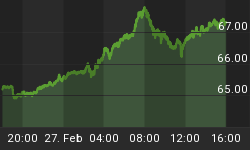As the Fed continues its inflation campaign, most have yet to come to grips with the reality of America's uniquely precarious situation. In an act of prestidigitation that would impress Harry Houdini, the Fed is now attempting to hide evidence of the most inflationary monetary policy in its history by no longer publishing data on the growth of M3, while mystifying the public with phony CPI statistics. However, the relentless rise in the price of gold is evidence that fewer people are being fooled by the Fed's slight of hand.
Gold's recent rise to just under $500 per ounce, gaining over $30 per ounce in November alone, indicates the market's expectation of both higher current inflation and increased expectations for future inflation. Higher long-term interest rates are sure to follow. As fiat currencies continue to lose value relative to gold, lenders world-wide will demand higher rates of return to compensate for that loss, ending the low interest rate environment that has nourished the global economy for the past six years.
Nowhere will the fallout be greater than in the United States, where the economy is more vulnerable than any other to the crippling effect of higher interest rates. As the world's biggest debtor, America will be forced to pay higher interest rates to creditor nations. The resulting drain on America's national income and strain on consumer spending will plunge its economy into a severe recession.
Under normal circumstances, debtors would benefit from higher inflation, which would greatly diminish the real burden of repayment. However, these are hardly normal times. Due to the irresponsible debt management of the Clinton and Bush administrations, the average maturity of the eight trillion dollar national debt is now under three years. Therefore our creditors are not stuck holding low yielding, long-term debt. They can simply refuse to roll-over maturing paper, or demand substantially higher interest rates for doing so.
In addition, under normal circumstances, a debtor nation would improve its lot by wiping out the real value of its liabilities through currency depreciation. Not so for the United States, where a hollowed out industrial base makes its citizens extremely vulnerable to a loss of confidence in its currency. Not only will Americans have to live without the products currently supplied by foreign manufactures, but the jobs associated with their distribution as well. In addition, without access to foreign savings, the rug will be pulled out from under the housing market and consumer spending, as well as the employment associated with each.
Do not let gold's warnings go unheeded. Download my free research report "The Collapsing Dollar: The Powerful Case for Investing in Foreign Equities" available at www.researchreport1.com, and get rid of your dollars before it's too late.















